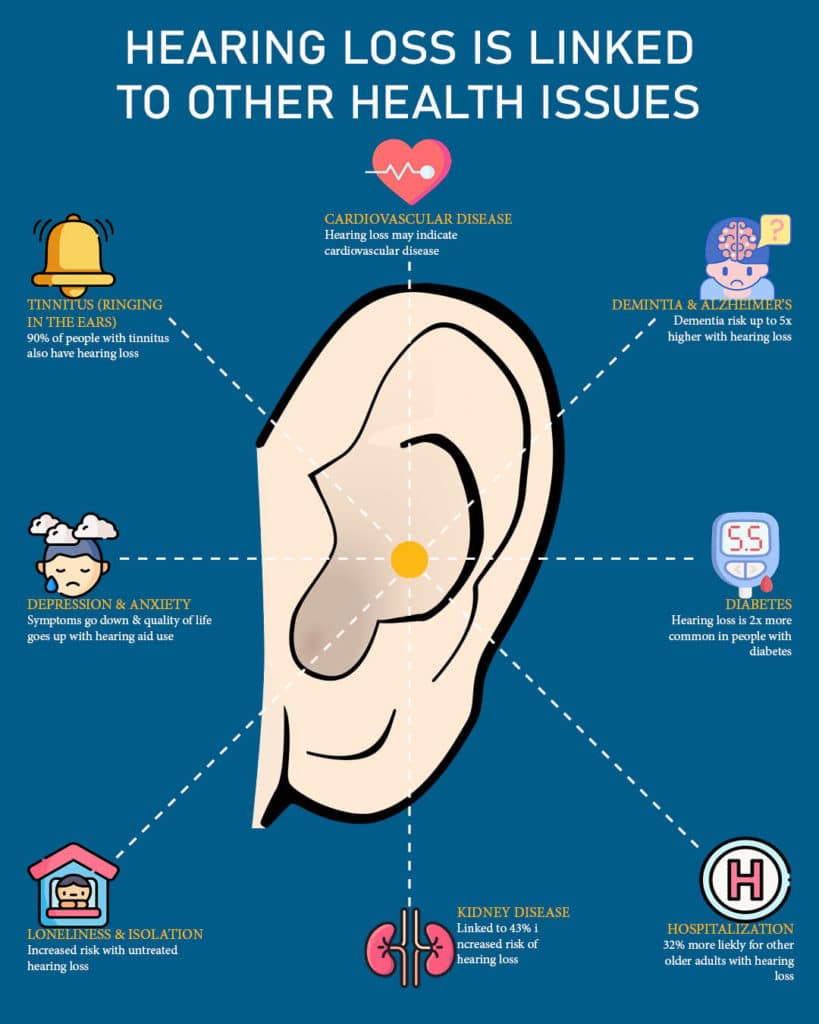
If you have a family member with a hearing problem, it’s not uncommon. 25% of Americans 65 and older experience hearing loss, and it can be difficult for everyone in the family if left untreated.
The answer can sometimes be as easy as seeing a hearing health care professional or a primary care physician, scheduling a hearing test, and getting your loved one fitted for a hearing aid. However, only 17% of Americans ages 20 – 69 who need hearing aids use them. That number increases for people 70 and older to around 30%. Having untreated or ignored hearing loss may not seem like the most pressing matter facing your family member. Still, it can have an enormous impact on their health and well being. Below are a few ways to talk to your family member and help them with their hearing.
What affects our hearing?
There are a few types of hearing loss, but the most common is aging. Age-related hearing loss (or Presbycusis) is the loss of hearing that occurs slowly over time as we get age. Age-related hearing loss generally occurs in both ears. Because the loss happens gradually over time, it can be challenging to realize that your hearing has declined.
Many times it can be frustrating for them to discover their hearing is declining. Still, very often, they refuse to acknowledge or accept it. This can make it difficult to track conversations or even hear sounds like sirens while driving. Not only is untreated hearing loss difficult, but it can also be dangerous.
A few common indicators that hearing loss is prevalent
- Regularly asking you to repeat your self or speak up
- The level of the radio or television is abnormally loud
- Becoming frustrated or embarrassed because they respond incorrectly to questions
- Complaining or upset about feeling left out of group conversations
- Not able to keep up with discussions in a group setting

Untreated hearing loss and wellness
Before we dive into talking to a family member or loved one about their hearing, it’s essential to understand the link between untreated hearing loss and comorbidities. Untreated hearing loss can lead to physical health issues such as cardiovascular disease. Dementia risk is up to five times higher with hearing loss. Hospitalization is 32% more likely within older adults with hearing loss, kidney disease, and tinnitus. However, two of the most common issues are depression and anxiety, and social isolation. These are much harder to see. Generally, someone with untreated hearing loss will slowly stop interacting within group settings and become more reserved. Studies have shown that when hearing aids are worn, these symptoms decrease.

Tips for talking about hearing loss
If you are ready to speak with a loved one about the use of hearing aids or even recommending they get their hearing checked, there are both good and bad ways to go about it. Only proposing they get hearing aids or get a hearing test can come across as insensitive or demeaning. This can become even more difficult if you have repeatedly tried to get them to consider hearing help. Here are a few tips to help you approach the subject.

1. Point out it’s recommended for everyone to have annual hearing tests done.
Like you would have a health check-up with your physician, eye doctor, and dentist on an annual basis. So too, you should include yearly hearing screenings with your local hearing care professional. This gives you the ability to track your hearing over time and notice any changes that come up. Because hearing loss occurs over time and subtly, annual screenings are the best way to monitor changes and catch any discrepancies as soon as possible.
It might be easier to help get them to see a professional if you show them hearing tests are for everyone and not just people who definitively have hearing loss. It might help convince them to make that appointment.
2. Explain the health benefits of hearing aids.
as mentioned above, hearing aids can help prevent or prolong many health and mental diseases, such as dementia, depression, cardiovascular and kidney disease, and more. More than ten years ago, research advised that hearing aids improve the overall quality of life. Taking care of hearing loss is much easier than any of the issues associated with leaving it untreated.
3. Focus on the effects
On average, those with hearing loss weight over seven years before deciding to visit a health care professional. Furthermore, untreated hearing loss worsens over time, and once it’s gone, it can not be restored.
Instead of speaking directly to the hearing loss problem itself, which can cause your loved one to become defensive, concentrate on how the hearing loss affects the rest of the families’ lives. You may mention how much you miss having them at family events or having them sit around the table during discussions. You might even say how much their grandchild misses being able to talk to them on the phone. Try to get them to open up to you about any other challenges they might face with hearing loss.
4. Team up
If your the only person advocating that your family member sees a hearing health care professional, it can make things difficult. Talk to others in the family or close friends to help you with your cause. Ask them to support and repeat the reasons your loved one should make an appointment. Ideally, they’ll be touched by how everyone in their circle keeps their best interest in mind.
5. Call your local professional and ask for their advice.
Your local health care professional has likely helped many people in the same boat you are in, and many of them will have had the same objections and hesitations your loved one has. Your professional may be able to help some handy tips to talking points to help persuade them.
At Salem Audiology Clinic, we also encourage that family members join during initial consultations and throughout the screening and fitting process. Letting the family member know that you are with them every step of the way can not only help them feel more confident in their decision, but it also allows you to show them that you’re genuinely dedicated to their happiness and well being.
We offer free educational classes and literature to help guide you and your loved one through the entire process. We discuss options and will find the best solution to meet each individual’s lifestyle and hearing needs.
Don’t let your family member miss out on the sounds and moments that matter the most any longer. Take our free online hearing test and contact Salem Audiology Clinic and ask how we can help today!

